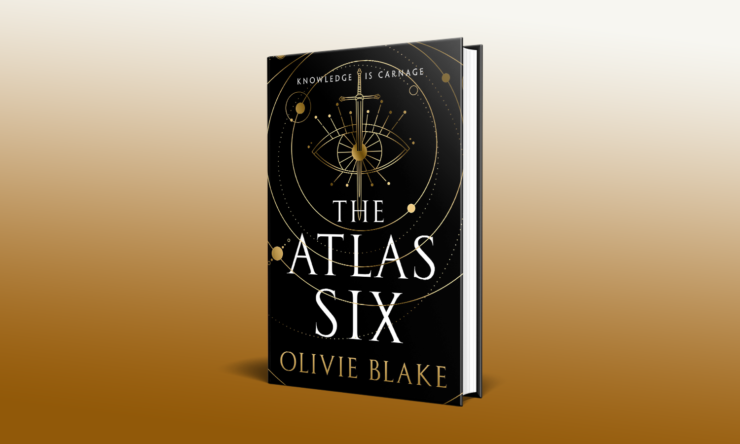Each decade, only the six most uniquely talented magicians are selected to be considered for initiation to the Alexandrian Society…
We’re thrilled to share audio clips and excerpts from Olivie Blake’s The Atlas Six—the newly revised and edited edition publishes March 1st with Tor Books and Macmillan Audio. Find more excerpts here!
The Alexandrian Society, caretakers of lost knowledge from the greatest civilizations of antiquity, are the foremost secret society of magical academicians in the world. Those who earn a place among the Alexandrians will secure a life of wealth, power, and prestige beyond their wildest dreams, and each decade, only the six most uniquely talented magicians are selected to be considered for initiation.
Enter the latest round of six: Libby Rhodes and Nico de Varona, unwilling halves of an unfathomable whole, who exert uncanny control over every element of physicality. Reina Mori, a naturalist, who can intuit the language of life itself. Parisa Kamali, a telepath who can traverse the depths of the subconscious, navigating worlds inside the human mind. Callum Nova, an empath easily mistaken for a manipulative illusionist, who can influence the intimate workings of a person’s inner self. Finally, there is Tristan Caine, who can see through illusions to a new structure of reality—an ability so rare that neither he nor his peers can fully grasp its implications.
When the candidates are recruited by the mysterious Atlas Blakely, they are told they will have one year to qualify for initiation, during which time they will be permitted preliminary access to the Society’s archives and judged based on their contributions to various subjects of impossibility: time and space, luck and thought, life and death. Five, they are told, will be initiated. One will be eliminated. The six potential initiates will fight to survive the next year of their lives, and if they can prove themselves to be the best among their rivals, most of them will.
Most of them.
The day Reina Mori was born there had been a fire blazing nearby. For an urban environment, particularly one so unaccustomed to flame, there was a heightened sense of mortality that day. Fire was so primitive, so archaic a problem; for Tokyo, an epicenter of advancements in both magical and mortal technologies, to suffer something as backward as the unsophistication of boundless flame was troublingly biblical. Sometimes, when Reina slept, the smell of it crept into her nose and she woke up coughing, retching a little over the side of her bed until the memory of smoke had cleared from her lungs.
The doctors knew she possessed power of the highest medeian caliber right away, exceeding even the trinkets of normal witchery, which were rare enough on their own. There wasn’t a lot of natural life to speak of in the high-rise of the hospital, but what did exist—the decorative plants sitting idly in the corners, handfuls of cut flowers in vases meant for sympathy—had crept toward her infant form like nervous little children, anxious and yearning and fearful of death.
Reina’s grandmother called her birth a miracle, saying that when Reina took her first breath, the rest of the world sighed back in relief, clinging to the bounty of life she gave them. Reina, on the other hand, considered her first breath to be the beginning of a lifetime’s set of chores.
The truth was that being labeled a naturalist shouldn’t have been such a drain on her as it was. There were other medeian naturalists, many who were born in rural areas of the country, who typically opted to enlist with large agricultural companies; there, they could be paid handsomely for their services in increasing soybean production or purifying water. That Reina was considered to be one of them, or that she would be called a naturalist at all, was something of a misclassification. Other medeians asked things of nature, and if they beckoned sweetly or worthily or powerfully enough, nature gave. In Reina’s case, nature was like an irritating sibling, or possibly an incurable addict who happened to be a relative, always popping up to make unreasonable demands—and Reina, who did not think much of family to begin with, did not care for the sensation, choosing most often to ignore it.
***
There were quite a lot of words for what Parisa was, which was something she supposed most people would not approve of. Perhaps it went without saying that Parisa didn’t put a lot of stock in approval. She was talented and smart, but above that—at least according to everyone who’d ever looked at her—she was beautiful, and being gifted approval for something that had been handed to her by some fortuitous arrangement of DNA instead of earned by her own two hands wasn’t something she felt was necessary to either idolize or condemn. She didn’t rail against her looks; didn’t give thanks for them, either. She simply used them like any other tool, like a hammer or a shovel or whatever else was necessary to complete the requisite task. Besides, disapproval was nothing worth thinking about. The same women who might have disapproved were quick to fawn over her diamonds, her shoes, her breasts—all of which were natural, never synthetic, not even illusioned. Whatever they wanted to call Parisa, at least she was authentic. She was real, even if she made a living on false promises.
Really, there was nothing more dangerous than a woman who knew her own worth.
Excerpted from The Atlas Six, copyright © 2022 by Olivie Blake.
Buy the Book


The Atlas Six










